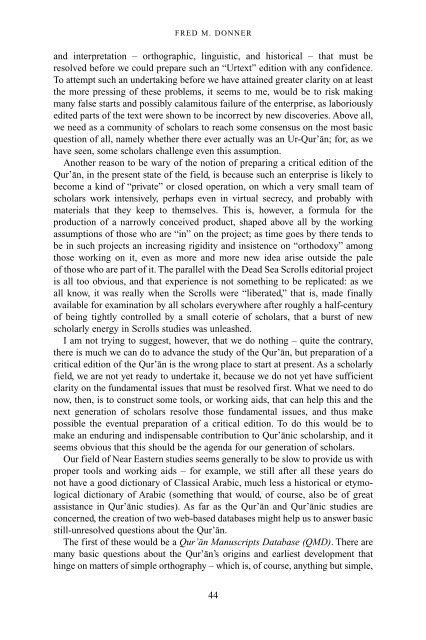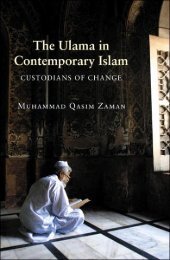The Qur'an in its historical context (pdf - Islam and Christian-Muslim ...
The Qur'an in its historical context (pdf - Islam and Christian-Muslim ...
The Qur'an in its historical context (pdf - Islam and Christian-Muslim ...
You also want an ePaper? Increase the reach of your titles
YUMPU automatically turns print PDFs into web optimized ePapers that Google loves.
FRED M. DONNER<br />
<strong>and</strong> <strong>in</strong>terpretation – orthographic, l<strong>in</strong>guistic, <strong>and</strong> <strong>historical</strong> – that must be<br />
resolved before we could prepare such an “Urtext” edition with any confidence.<br />
To attempt such an undertak<strong>in</strong>g before we have atta<strong>in</strong>ed greater clarity on at least<br />
the more press<strong>in</strong>g of these problems, it seems to me, would be to risk mak<strong>in</strong>g<br />
many false starts <strong>and</strong> possibly calamitous failure of the enterprise, as laboriously<br />
edited parts of the text were shown to be <strong>in</strong>correct by new discoveries. Above all,<br />
we need as a community of scholars to reach some consensus on the most basic<br />
question of all, namely whether there ever actually was an Ur-Qur’an; for, as we<br />
have seen, some scholars challenge even this assumption.<br />
Another reason to be wary of the notion of prepar<strong>in</strong>g a critical edition of the<br />
Qur’an, <strong>in</strong> the present state of the field, is because such an enterprise is likely to<br />
become a k<strong>in</strong>d of “private” or closed operation, on which a very small team of<br />
scholars work <strong>in</strong>tensively, perhaps even <strong>in</strong> virtual secrecy, <strong>and</strong> probably with<br />
materials that they keep to themselves. This is, however, a formula for the<br />
production of a narrowly conceived product, shaped above all by the work<strong>in</strong>g<br />
assumptions of those who are “<strong>in</strong>” on the project; as time goes by there tends to<br />
be <strong>in</strong> such projects an <strong>in</strong>creas<strong>in</strong>g rigidity <strong>and</strong> <strong>in</strong>sistence on “orthodoxy” among<br />
those work<strong>in</strong>g on it, even as more <strong>and</strong> more new idea arise outside the pale<br />
of those who are part of it. <strong>The</strong> parallel with the Dead Sea Scrolls editorial project<br />
is all too obvious, <strong>and</strong> that experience is not someth<strong>in</strong>g to be replicated: as we<br />
all know, it was really when the Scrolls were “liberated,” that is, made f<strong>in</strong>ally<br />
available for exam<strong>in</strong>ation by all scholars everywhere after roughly a half-century<br />
of be<strong>in</strong>g tightly controlled by a small coterie of scholars, that a burst of new<br />
scholarly energy <strong>in</strong> Scrolls studies was unleashed.<br />
I am not try<strong>in</strong>g to suggest, however, that we do noth<strong>in</strong>g – quite the contrary,<br />
there is much we can do to advance the study of the Qur’an, but preparation of a<br />
critical edition of the Qur’an is the wrong place to start at present. As a scholarly<br />
field, we are not yet ready to undertake it, because we do not yet have sufficient<br />
clarity on the fundamental issues that must be resolved first. What we need to do<br />
now, then, is to construct some tools, or work<strong>in</strong>g aids, that can help this <strong>and</strong> the<br />
next generation of scholars resolve those fundamental issues, <strong>and</strong> thus make<br />
possible the eventual preparation of a critical edition. To do this would be to<br />
make an endur<strong>in</strong>g <strong>and</strong> <strong>in</strong>dispensable contribution to Qur’anic scholarship, <strong>and</strong> it<br />
seems obvious that this should be the agenda for our generation of scholars.<br />
Our field of Near Eastern studies seems generally to be slow to provide us with<br />
proper tools <strong>and</strong> work<strong>in</strong>g aids – for example, we still after all these years do<br />
not have a good dictionary of Classical Arabic, much less a <strong>historical</strong> or etymological<br />
dictionary of Arabic (someth<strong>in</strong>g that would, of course, also be of great<br />
assistance <strong>in</strong> Qur’anic studies). As far as the Qur’an <strong>and</strong> Qur’anic studies are<br />
concerned, the creation of two web-based databases might help us to answer basic<br />
still-unresolved questions about the Qur’an.<br />
<strong>The</strong> first of these would be a Qur’an Manuscripts Database (QMD). <strong>The</strong>re are<br />
many basic questions about the Qur’an’s orig<strong>in</strong>s <strong>and</strong> earliest development that<br />
h<strong>in</strong>ge on matters of simple orthography – which is, of course, anyth<strong>in</strong>g but simple,<br />
44



